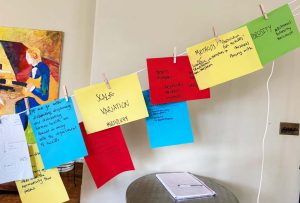It is widely recognised that biological, microbial and social processes interact. Behind this headline there is much less agreement about how the social world should be conceptualised and understood. One response is that practices – not social structures, and not individual behaviours – constitute the ‘site’ of the social. In recent years,
practice theorists have generated a distinctive and powerful repertoire of ideas about materiality, inequality and global change. The result is an inspiring and generative body of social theory that provides the basis for interdisciplinary alliances and for new ways of thinking about the social dynamics of microbiomes.
Reading rooms – open to all. Online.
The format is that everyone who wants to come registers with Elizabeth Shove (e.shove@lancaster.ac.uk) and reads the chosen paper in advance. All participants have some questions they’d like to put to the author and we then discuss the text with the author present.
9am. 3rd February 2026, Simon Cohn, LSHTM, ‘Microbes at large in the hospital: challenging concepts of care, contact and contamination’
9am. 3rd March 2026, Stanley Blue, Lancaster, ‘Practice theory and the biosocial body’.
9am. 31st March 2026, Cecily Maller, RMIT, ‘Microbes and social practices: material, performer, friend or foe?’
Previous events
Reading rooms
Mike Kelly, University of Cambridge, 9.00 am UK time, 6th November 2025. Epidemiology, Individualism and the Virus: A critical analysis of policy responses to COVID 19 in the UK.
Rachel Wakefield Rann, University of Technology, Sydney. 9.00 am UK time, 11th December 2025 (reading to be decided, but likely to be a chapter, possibly the introduction, from Rachel’s new book, Life Indoors).
Karl Broome, Universitat Pomepu Fabra, Spain, 9.00 am UK time, 8th January 2026, Practices, Spaces, and Species: Rethinking Human-Mosquito Interactions and Disease Transmission
Conference
Elizabeth Shove (Lancaster), Cecily Maller (RMIT), and Simon Cohn (LSHTM) organised a two day conference on this topic with support from the British Academy and Wellcome, held at Mary Ward House, in London on 11th and 12th June 2025.
These pictures show the line up of participants organised by birthday, the washing lines of ideas, and more informal chattering in the garden.
Audio recordings of most of the talks can be found here.
Elizabeth Shove
Cecily Maller
Beth Greenhough
Paula Palanco Lopez
Stephen Hinchliffe
Mick Worboys
Karl Broome
Mikko Jauho
Simon Cohn
Maurizio Meloni
Jamie Lorimer
Stanley Blue (apologies, this recording is not available)
Aaron Bradshaw (apologies, this recording is not available but you can read the text of the talk here)
In preparation for an edited book related to this conference we organised a series of recorded conversations and online seminars.
Recorded conversations
Stephen Hinchliffe, a geographer from Exeter, on disease situations and more than human relations – in conversation with Simon Cohn and Elizabeth Shove
Matthew Gandy, a geographer from Cambridge, on urban infrastructure and disease – in conversation with Karl Broome and Elizabeth Shove
Online seminars
The seminars focus on abstracts submitted for the book, using these as a springboard for further discussion of the ideas raised, and of points of difference and simiarity. By invitation only.
- Practice theories and ideas about how diseases spread. 9 am. 19th February 2025. Elizabeth Shove and Karl Broome.
- Practice theories and matters of microscopic materiality. 9am. 19th March 2025.
Mikko Jauho, Jamie Lorimer, George Cusworth, Beth Greenhough and Cecily Maller. - Practice theories, bodies and histories of ideas. 9am. 14th May 2025
Stan Blue, Simon Cohn and Maurizio Meloni.
Previous events in which invited participants and contributors have discussed papers that deal with related issues included:
27th March 2024, 9am. Catherine Will, (2016) On difference and doubt as tools for critical engagement with public health. Critical Public Health, 27 (3). pp. 293-302.
24th April 2024, 9am. Steve Hinchliffe (2022) Postcolonial Global Health, Post-Colony Microbes and Antimicrobial Resistance,Theory, culture & society 2022 Vol. 39 Issue 3 Pages 145-168
29th May 2024, 9am. Beth Greenhough et al.(2018) Unsettling antibiosis: how might interdisciplinary researchers generate a feeling for the microbiome and to what effect?Palgrave communications Vol. 4 Issue 1 Pages 149.
26 June 2024, 9am. Jamie Lorimer, (2016) Gut Buddies: Multispecies Studies and the Microbiome, Environmental Humanities Vol. 8 Issue 1 Pages 57-76
24th July 2024, 9am. Cecily Maller and Maurizio Meloni (2024) Revitalizing Air: More-than-Human Relations in Urban Health Beyond the Modern-Premodern Binary, GeoHumanities.
25th September 2024, 9am. Elizabeth Shove, Stan Blue and Mike Kelly, (2024), Categorising and cohabiting: practices as the site of biosocial becoming, Social Theory & Health
23rd October 2024, 9am. Introduction to The Nexus of Practices: Connections, Constellations, Practitioners, edited by Allison Hui, Ted Schatzki and Elizabeth Shove. 2017. Routldege.
20th November 2024, 9am. Ted Schatzki, ‘Keeping Track of Large Phenomena’ 2016, Geographische Zeitschrift Vol. 104 Issue 1 Pages 4-24, https://www.ingentaconnect.com/content/fsv/gz/2016/00000104/00000001/art00002
11th December 2024, 9am. Stanley Blue and Nicola Spurling, 2017, ‘Qualities of connective tissue in hospital life: how complexes of practices change’ in The Nexus of Practices, edited by A. Hui, T. Schatzki and E. Shove
A starter pack of a few other readings relating to practice theory
Blue, S., E. Shove, C. Carmona and M. P. Kelly (2014). “Theories of practice and public health: understanding (un)healthy practices.” Critical Public Health: 1-15.
Gherardi, S. (2017). Sociomateriality in posthuman practice theory. The Nexus of Practices: Connections, Constellations, Practitioners. A. Hui, T. R. Schatzki and E. Shove. Abingdon, Oxon, Routledge: 38-67.
Hui, A., T. R. Schatzki and E. Shove (2017). Introduction to: The Nexus of Practices: Connections, Constellations, Practitioners. Abingdon, Oxon, Routledge.
Landecker, H. (2016). “Antibiotic Resistance and the Biology of History.” Body & society 22(4): 19-52.
Maller, C. (2017). Epigenetics, theories of social practice and lifestyle disease. The nexus of practices: connections, constellations, practitioners. A. Hui, T. R. Schatzki and E. Shove. Abingdon, Oxon, Routledge: 68-80.
Reckwitz, A. (2002). “Toward a Theory of Social Practices: A Development in Culturalist Theorizing.” European Journal of Social Theory 5(2): 243-263.
Shove, E. and M. Pantzar (2005). “Consumers, producers and practices: understanding the invention and reinvention of Nordic walking.” Journal of Consumer Culture 5(1): 43-64.
Shove, E. (2010) ‘Beyond the ABC: climate change policy and theories of social change’ Environment and Planning A 2010 Vol. 42 Issue 6 Pages 1273-1285
Not officially rooted in practice theory, but this is a strong critique of the focus on individual behaviour. This article was responded to (negatively) by Lorraine Whitmarsh and colleagues. L. Whitmarsh, S. O’Neill and I. Lorenzoni, 2011, ‘Climate change or social change? Debate within, amongst, and beyond disciplines’ Environment and Planning A 2011 Vol. 43 Issue 2 Pages 258-261
to which there is a response;
Shove, E. 2011, ‘On the difference between chalk and cheese?a response to Whitmarsh et al’s comments on “Beyond the ABC: climate change policy and theories of social change”‘ Environment and Planning A 2011 Vol. 43 Issue 2 Pages 262-264.
Warin, M., V. Moore, M. Davies and S. Ulijaszek (2016). “Epigenetics and Obesity: The Reproduction of Habitus through Intracellular and Social Environments.” Body & society 22(4): 53-78.
.. more suggestions welcome.
Grant reference: BAC25\250108



